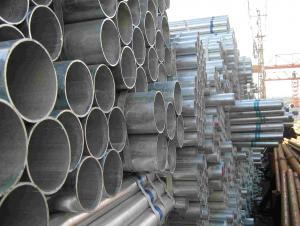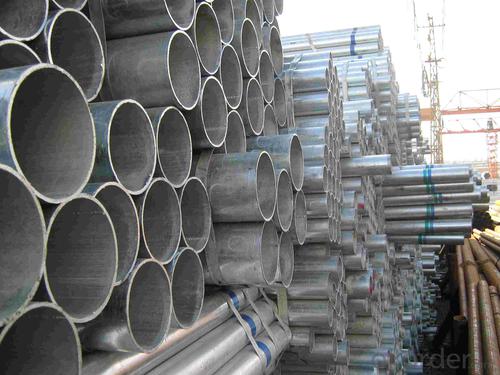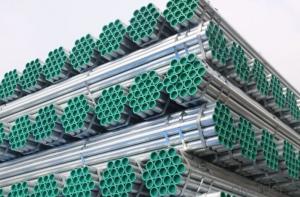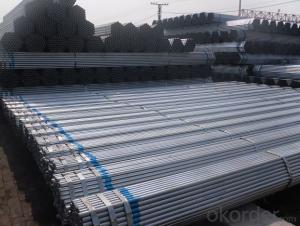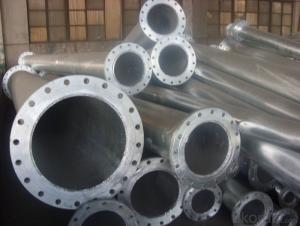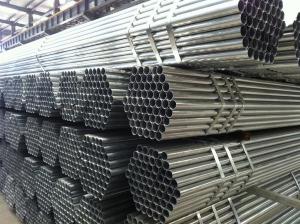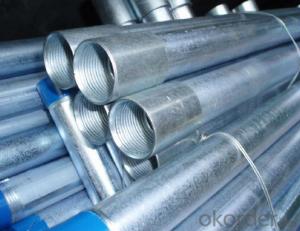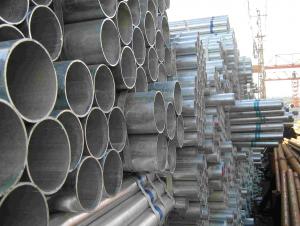Hot Dipped or Pre-galvanized Galvanized Pipe Hot Dipped or Pre-galvanized Pipe
- Loading Port:
- Tianjin
- Payment Terms:
- TT or LC
- Min Order Qty:
- 45 m.t.
- Supply Capability:
- 9000 m.t./month
OKorder Service Pledge
OKorder Financial Service
You Might Also Like
1、Structure of Hot Dipped or Pre-galvanized Galvanized Pipe America 100g Hot Dipped or Pre-galvanized Pipe:
The surface of Hot Dipped or Pre-galvanized Galvanized Pipe America Standard A53 100g Hot Dipped or Pre-galvanized Pipecan increase the corrosion resistance of the steel tube, prolong service life. Galvanized pipe is widely used, in addition to water, gas, oil and other general low pressure fluid pipelines. It is also used in the petroleum industry, especially for offshore oil field of oil well pipe and oil pipe, chemical, coking equipment of oil heater, condensation cooler, coal run oil exchanger tube, and trestle pile, the mine tunnel support frame tube.
2、Main Features of Hot Dipped or Pre-galvanized Galvanized PipeStandard A53 100g Hot Dipped or Pre-galvanized Pipe:
• High manufacturing accuracy with standard
• High strength and stable
• Good visual effect
• Reasonable price
• Small inertia resistance
• Strong heat dissipation ability
3、Hot Dipped or Pre-galvanized Galvanized Pipe A53 100g Hot Dipped or Pre-galvanized Pipe Specification:
Standard | GB, DIN, ASTM ASTM A106-2006, ASTM A53-2007 |
Grade | 10#-45#, 16Mn 10#, 20#, 45#, 16Mn |
Thickness | 1 - 33 mm |
Section Shape | Round |
Outer Diameter | 21 - 610mm |
Place of Origin | Tianjin, China (Mainland) |
Secondary Or Not | Non-secondary |
Application | Hydraulic Pipe |
Technique | Cold Drawn |
Certification | API |
Surface Treatment | factory state or painted black |
Special Pipe | API Pipe |
Alloy Or Not | Non-alloy |
Length | 5-12M |
Outer Diameter | 21.3-610mm |
Grade | 20#, 45#, Q345, API J55, API K55, API L80, API N80, API P110, A53B |
Standard | ASME, ASTM |
1) Material:20#(ASTM A 106/A53 GRB.API5LGRB,GB),45#,16Mn,10#.
2) Specification range:OD:21.3-610mm,WT:6-70mm,length:6-12m or according to the requirement of clients.
3) Excutive standards:GB,ASME API5L.ASTM A 106/A53,Despite of the above standards,we can also supply seamless steel pipe with standard of DIN,JIS,and so on,and also develop new products according to the requirements of our clients!
4) Surface:black lacquered,varnish coating or galvanized.
5) Ends:Beveled or square cut,plastic capped,painted.
6) Packing:bundles wrapped with strong steel strip,seaworthy packing.
4、Packaging & Delivery
Packaging Details: | seaworthy package,bundles wrapped with strong steel strip |
Delivery Detail: | 15-30days after received 30%TT |
5、FAQ of Hot Dipped or Pre-galvanized Galvanized Pipe America Standard A53 100g Hot Dipped or Pre-galvanized Pipe:
①How is the quality of your products?
Our products are manufactured strictly according to national and internaional standard, and we take a test
on every pipe before delivered out. If you want see our quality certifications and all kinds of testing report, please just ask us for it.
Guaranteed: If products’ quality don’t accord to discription as we give or the promise before you place order, we promise 100% refund.
③Why should you chose us?
Chose happens because of quality, then price, We can give you both.Additionally, we can also offer professional products inquiry, products knowledge train(for agents), smooth goods delivery, exellent customer solution proposals.Our service formula: good quality+good price+good service=customer’s trust
SGS test is available, customer inspection before shipping is welcome, third party inspection is no problem.
6、 Hot Dipped or Pre-galvanized Galvanized Pipe America Standard A53 100g Hot Dipped or Pre-galvanized Pipe: Images:
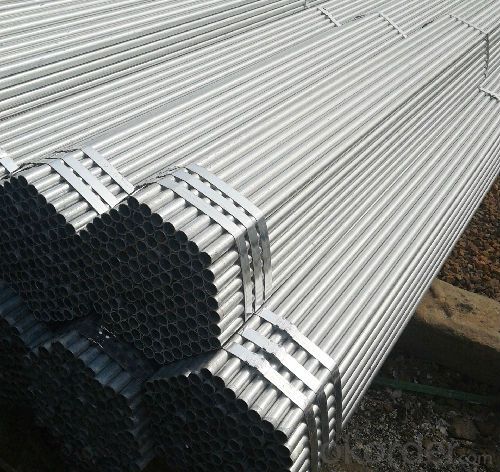
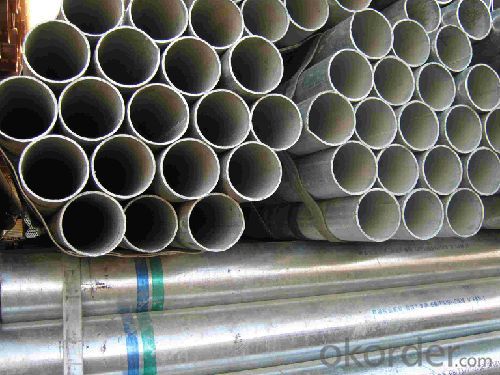
- Q: What are the environmental benefits of using steel pipes?
- There are several environmental benefits of using steel pipes: 1. Durability: Steel pipes have a long lifespan, which reduces the need for frequent replacements. This helps to conserve resources and reduces the amount of waste generated. 2. Recyclability: Steel is one of the most recycled materials in the world. When steel pipes reach the end of their life, they can be easily recycled and used to manufacture new steel products. This reduces the demand for raw materials and saves energy that would otherwise be required for the production of new materials. 3. Reduced carbon emissions: Steel pipes have a low carbon footprint compared to other materials like concrete or plastic. The manufacturing process for steel pipes produces fewer greenhouse gas emissions, contributing to a lower carbon footprint overall. 4. Resistance to corrosion: Steel pipes have high resistance to corrosion, which means they require less maintenance and repair compared to other materials. This reduces the use of chemical coatings and treatments that can have negative environmental impacts. 5. Water conservation: Steel pipes are commonly used for water supply and distribution systems. They have smooth interiors that minimize friction, reducing the amount of energy required to pump water through the pipes. This helps to conserve energy and decrease the carbon emissions associated with water transportation. 6. Fire resistance: Steel pipes are inherently fire-resistant, which makes them a safer choice for many applications. In the event of a fire, steel pipes can help to contain the spread of flames and minimize damage to the environment. Overall, the use of steel pipes offers numerous environmental benefits such as durability, recyclability, reduced carbon emissions, water conservation, and fire resistance. These factors make steel pipes a sustainable choice for various infrastructure projects.
- Q: Can galvanized steel tubes simmer?
- Galvanized steel pipe can simmer bending.Is a set of bending bending bending die, no matter what kind of equipment, most are used in pipe, mainly used for oil and gas, infusion, more plays an important role in aircraft and engine.
- Q: What are the different methods of joining steel pipes?
- There are several different methods of joining steel pipes, including threaded connections, weld connections, flanged connections, and grooved connections. Each method has its own advantages and is suited for different applications. Threaded connections involve screwing the pipes together using threads on the ends of the pipes. Weld connections involve fusing the ends of the pipes together through welding. Flanged connections involve using a flange on each end of the pipe and bolting them together. Grooved connections involve using grooves on the ends of the pipes and connecting them with coupling fittings.
- Q: What is the maximum allowable stress for steel pipes?
- The maximum allowable stress for steel pipes depends on various factors such as the grade of steel, diameter, wall thickness, and the intended application. It is typically determined by industry standards and codes, such as the American Society of Mechanical Engineers (ASME) Boiler and Pressure Vessel Code. Therefore, there is no one-size-fits-all answer to this question.
- Q: What are steel pipes?
- Steel pipes are hollow cylindrical tubes made from steel, which are mainly used for transporting fluids and gases in various industries such as oil and gas, construction, and plumbing. They are known for their strength, durability, and resistance to corrosion, making them an essential component in infrastructure and industrial applications.
- Q: How are steel pipes protected against ultraviolet radiation?
- Steel pipes are typically protected against ultraviolet radiation by applying a coating or paint that contains UV-resistant additives. This coating acts as a barrier, preventing the harmful effects of UV radiation from causing damage or degradation to the steel surface.
- Q: What do you mean by "SC" in welded pipe SC200? What's the diameter of 200?
- SC in principle, it should be called water gas pipe, also called thick wall steel pipe;
- Q: What are the common methods for inspecting the condition of steel pipes?
- Some common methods for inspecting the condition of steel pipes include visual inspection, ultrasonic testing, magnetic particle inspection, dye penetrant inspection, and radiographic testing.
- Q: What is the maximum length of a steel pipe?
- The maximum length of a steel pipe can vary depending on several factors such as the manufacturing process, transportation limitations, and structural requirements. However, in general, steel pipes can be manufactured in lengths up to 80 feet or more.
- Q: What is the cost of steel pipes compared to other piping materials?
- The cost of steel pipes can vary based on factors like size, grade, and specifications, as well as market conditions and location. Generally, steel pipes are more expensive than materials like PVC or HDPE. However, when compared to materials like copper or stainless steel, steel pipes can often be more cost-effective. Steel pipes are known for their durability, strength, and resistance to high pressures and temperatures, making them suitable for various applications such as oil and gas pipelines, plumbing systems, and structural supports. Their longevity and reliability can offset the initial higher cost, as they require less maintenance and have a longer lifespan than other materials. Moreover, steel pipes are readily available in different sizes and grades, making them versatile and adaptable to different project requirements. This availability and versatility contribute to their cost-effectiveness, as they can be easily sourced and customized to specific needs. It is important to consider that prices for steel pipes can fluctuate due to market conditions and factors like raw material costs, transportation expenses, and labor charges. Therefore, it is advisable to consult with suppliers or industry experts for accurate pricing information based on specific project specifications and market conditions.
Send your message to us
Hot Dipped or Pre-galvanized Galvanized Pipe Hot Dipped or Pre-galvanized Pipe
- Loading Port:
- Tianjin
- Payment Terms:
- TT or LC
- Min Order Qty:
- 45 m.t.
- Supply Capability:
- 9000 m.t./month
OKorder Service Pledge
OKorder Financial Service
Similar products
Hot products
Hot Searches
Related keywords
